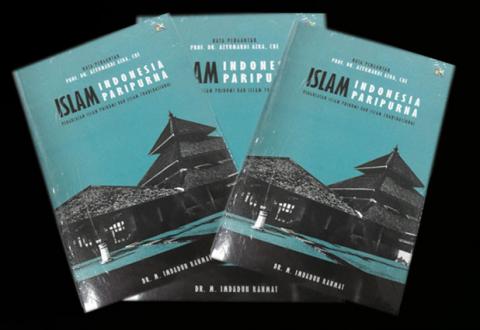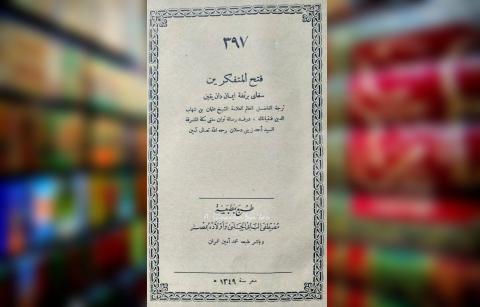Adonis criticizes the establishment of Arab-Islamic culture
NU Online · Senin, 24 Maret 2008 | 01:00 WIB
Translated from : Ats-tsabit wa al-Mutahawwil: Bahts fi al-Ibda’ wa al-ittiba’ Inda al-Arab
Writer : Adonis
Translator : Dr Khairon Nahdiyyin, MA
Publisher : LKiS, Yogyakarta
Edition : I, September 2007
Thick : vi + 369 halaman
Reviewer : Minan Nuri Rohman
The name of Adonis is not so strange for those enthusiastically studying West-Asian literature and culture around the world. Ali Ahmad Said (Adonis : read) is a Syrian poem and essayist; was born in 1930 and has been living in French. He has some of the time been nominated as the candidate of Nobel prize winner in the field of literature through his innovative works, potentially fueling such awareness in creating recent cultures to be more progressive and dynamic. One of his efforts in meeting the goal is criticizing the establishment of Arab-Islamic culture (ats-tsabit).<>
Arab civilization is considered as one of the greatest sites in the historiography of world’s records. Islam had ever reached its triumphs in the era of Abbasiyah dynasty. Since then Islam has never reached its victorious ‘wings’ caused primarily by each circle’s internal disputes. They have still been busy with their own stand in fighting for truth claim leading to both the disputes and truth claims between them.
The scene is then be such a stepping-stone and critics for Adonis as written in his dissertation at the East Literature Program St. Yosef University of Beirut, entitled “Ats-tsabit wa al-Mutahawwil: Bahts fi al-Ibda’ wa al-ittiba’ Inda al-Arab”. In this regard, Adonis defines the establishment as a thinking based mainly on religious text. While the change is defined into two meanings. First is the thinking that is based on (religious) text through interpretation of both reality and change. Second is the one regarding the text whose no any authority and based merely on reason rather than naqli (legacy or revelation). Page (vii)
The fierce battle of the two camps (ats-tsabit and al-mutahawwil) having up to now come into existence in Arab and Islamic world can not be separated from the assumption in interpreting and understanding religious texts (the Quran and Hadits) in the modern era. There have been some basing their understanding about truth on both the Quran and Hadits without any alteration. At the same time there have been some basing their understanding on reason rather than religious text. And even there have been some trying to integrate the two different parties’ viewpoints and calling themselves as “moderate party”.
In Indonesian context, the “truth claim” phenomenon between the majority (ats-tsabit) and minority (reformist: al mutahawwil) is not far from the reality having so far happened in Arab world. The majority has always committed physical forcing acts to the reformists pursuing the coming of change. Those labeled as reformists would likely be marginalized through majority powers whose quantitatively more followers and power in the most important sector, namely government. Behind the mass power, the majority standing firm in ‘prosperity’ would always discredit the reformists and even label them as ‘infidel’, apostate, heresy (bid'ah) or misleading sect. (page x).
Adonis, in his book, has tried reopen the spirit of Islamic greatest heyday having for long time been buried in the dark of what called as status quo. Through the exploration of thought and data presented in the book, the writer tries to call us to follow the long debate of the Arab-Islamic society, especially among parties holding firmly on the establishment and those pursuing the stand of reform or renewal. It is not so surprised if those whose different points of view call Adonis as a controversial figure.
Dissenting opinions in a community or religious conviction (internal-external) constitute a classic phenomenon remaining interesting enough to further discuss and requiring more attention in dealing with the opinions. Though Islam is viewed as a religion that has high tolerance to its adherents and fellow human beings, but the dispute must come into existence as such opposition that always covers it. Instead of immediately giving negative verdict to those pursuing the change over the establishment, each of us should hold dialogs in seeking win-win solution for the achievement of Islam as blessing for the universe (rahmatan lil alamin).
This book comprehensively would elaborate phenomena happening in Arab-Islamic society’s life and its cultural movements and thoughts followed by both disputes and fierce battles between them. They have tried to defend the (imitative) establishment on one hand and expected the existence of dynamic (cultural) change.
The reviewer is social-cultural analyst at The Institute of Yogyakarta’s KUTUB Study
Terpopuler
1
Khutbah Jumat: Ramadhan dan Kesempatan yang Tidak Selalu Terulang
2
Keluar Mani yang Tidak dan Membatalkan Puasa
3
Khutbah Jumat: Ramadhan, Melatih Sabar, Memperkuat Syukur
4
Khutbah Jumat: Tiga Kebahagiaan Orang Puasa
5
Kultum Ramadhan: Keutamaan Tarawih dan Witir
6
Khutbah Jumat: 4 Cara Menghidupkan Malam Ramadhan dengan Ibadah
Terkini
Lihat Semua
















